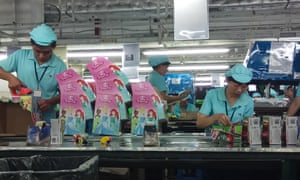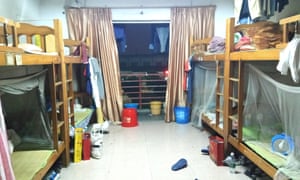The
grim truth of Chinese factories producing the west’s Christmas toys
Undercover investigation by China Labor Watch exposes low wages,
hazardous chemicals and overtime beyond legal limits
 Disney
Princess dolls on the production line at Shenzhen Wei Lee Fung Plastic
Products. Photograph: Gethin Chamberlain/China Labor Watch
Disney
Princess dolls on the production line at Shenzhen Wei Lee Fung Plastic
Products. Photograph: Gethin Chamberlain/China Labor Watch
Saturday 3 December
2016 19.05 EST
Xiao Fang thinks she’s one of the luckier workers making Barbie
dolls for the Christmas market at the Mattel toy factory in Chang’an.
True, she says, she works 11-hour days, six days a week, and
shares a dormitory with nine other women and gets to see her husband only once
a week. She had to leave her three-year-old daughter back home in Sichuan. And
there is only a communal bathroom, and if they want hot water they must fetch
it from another floor. But at least she has a job, she says. And others have it
worse.
Xiao is one of thousands of workers in Chinese factories making
some of this year’s must-have Christmas toys.
An investigation with the US-based NGO China Labor Watch reveals that toys
including Barbie, Thomas the Tank Engine and Hot Wheels were made by staff
earning as little as 86p an hour.
Overtime can run to nearly three times the legal limit. In some
factories – including one producing Happy Meal toys for McDonald’s from the new
DreamWorks movie Trolls – that means some are on 12-hour
shifts and have to work with hazardous chemicals.
According to China Labor Watch, the world of toys may be
heaven for children, but it is a world of misery for toy factory workers.
The group’s founder and executive director, Li Qiang, said: “We
can’t tolerate that children’s dreams are based on workers’ nightmares, and we
must fight against the unfair oppression of workers who manufacture toys.”
Undercover investigators infiltrated four factories, and the
group shared wage slips and pictures with the Observer to
support their findings.
The investigators said that they found workers making toys in
factories supplying Disney, Mattel, Fisher-Price and McDonald’s who reported
having to do more than 100 hours of overtime a month – nearly three times the
legal limit in China.
But the toy industry’s own watchdog, the ICTI Care Foundation,
says it is powerless to stop many Chinese factories breaking the law on
overtime.
“The reality is, across the board, most factories, or the vast
majority at least, work way beyond legal limits in China, and legal limits are
almost universally ignored,” said Mark Robertson, ICTI Care’s director of
communications. “Our position is, we want transparency. We want to know how
many hours are worked in the factories, so we can make sure workers are paid
for every minute that they work.”

Dormitory-style
accommodation for workers at the Foshan Nanhai Diecast Company, which makes
toys for Mattel. Photograph: Gethin Chamberlain/China Labor Watch
Some of this year’s must-have brands were made in the factories
visited by the undercover team. At the Foshan Nanhai Diecast Company factory
the basic salary for workers was just 86p an hour. Toys photographed inside the factory
included Thomas the Tank Engine Minis and Hot Wheels Guardians of the Galaxy,
as well as the Cars Piston Cup racing garage and the Fisher-Price Learn with Me
Zebra Walker. Fisher-Price is owned by Mattel.
Working all available overtime and with all allowances and
deductions applied, a worker takes home far less than the average wage in
Chinese cities of £715 a month.
An undercover investigator who joined the company as a worker
described having to work with isoamyl acetate – commonly know as banana oil –
which can soften and dissolve plastics. The investigator worked on a production
line and came into direct contact with the substance, reporting that some
workers had complained to management about the strong odour.
Staff also claimed that the company offered prizes for the three
most productive workers every day. The prize was a pack of paper towels.
At the Chang’an Toy factory, investigators photographed toys
from Mattel’s Monster High range of dolls and spoke to workers who said that
they made the company’s Barbie dolls. A large pink Barbie banner hangs on the
outside of the building.
The factory employs about 4,200 people, and workers again
claimed they worked more than 100 hours a month overtime at peak periods,
starting on a base wage of £1.08 an hour. The basic monthly wage was £188 and
the maximum take-home pay after overtime, allowances and deductions was £337.
The investigators said that the average working week was 68.3
hours. Chinese labour law allows a maximum of only 36 overtime hours a month. A
worker averaging 68.3 hours a week would be working an average 88 hours of
overtime a month – but workers claimed the figure was higher during peak
production periods over the summer.
At the Combine Will factory in Dongguang, which employs about
2,700 people, investigators photographed toys being manufactured for McDonald’s
Happy Meals, including Hello Kitty toys and Trolls pencil
toppers based on characters from the DreamWorks film.
The investigators interviewed workers in the cutting section,
who said they sometimes clocked up 100 hours of overtime a month. They also
found that the inside of the building could get as hot as 31C. Wages started at
£1.08 an hour and some workers say they were expected to work with banana oil
and isopropyl alcohol, which can cause dizziness and even death in high
concentrations. The basic wage for a five-day week was £189 a month, with the
upper limit of take-home pay about £337. However, some workers on piece rate
were able to earn as much as £482 a month.
In the Shenzhen Wei Lee Fung Plastic Products Co factory,
investigators photographed Fisher-Price Imaginext DC Super Friends toys –
including Batman – along with Disney Princess dolls and toys from the
Fisher-Price Little People range.
The factory employs about 2,000 workers, who reported that they
started on a basic wage of £1.16 an hour and claimed they were expected to work
more than 100 hours of overtime.
An investigator joining the company undercover was required to
sign a statement promising to accept any punishment handed out.
China Labor Watch’s Li Qiang accused the toy companies of
exploiting Chinese workers. He said: “Workers in toy factories face heavy
workloads every day, but only earn an extremely low wage. They have children as
well.
“Those who earn high profits from toys have done so by
oppressing the interests of workers, and as such their negligence should be
subject to public and moral condemnation.”
A spokesman for McDonald’s said: “As purchasers of toys from
Combine Will, we take these allegations very seriously. We are committed to
ensuring fair and ethical workplace standards in every corner of our supply
chain.
“We are working closely with ICTI Care in its investigation as
well as overseeing a thorough review of these allegations, and will swiftly and
effectively address any issues that are identified.”
A Mattel spokesman said: “Mattel is committed to ensuring every
single person making our toys and products is treated fairly, with respect and
is able to work in a safe and healthy environment. Our labour standards,
environmental, health and safety programmes and oversight processes reflect
this commitment, and we stand behind our record of ethical labour practices and
environmental stewardship.
“We are devoted to ensuring that our manufacturing facilities
throughout the world are safe and ethical places to work, and we reject any
suggestion to the contrary.”
Disney referred requests for comment to ICTI Care. Its director,
Mark Robertson, said the organisation took the accusations “extremely
seriously” and promised a “robust investigation”. He said standards in the
industry were improving and the wellbeing of factory workers was the “core
priority”.
The Toy Retailers Association said it would work with the
industry to tackle the issues raised by the investigation. A spokesman said:
“The Toy Retailers Association views the China Labor Watch report with concern,
which we know is shared throughout the industry.
“Our members are conscientious retailers who abide by a code of
ethics with regard to where and how they purchase toys, which includes
compliance with all UK, European and wider standards.”
No comments:
Post a Comment